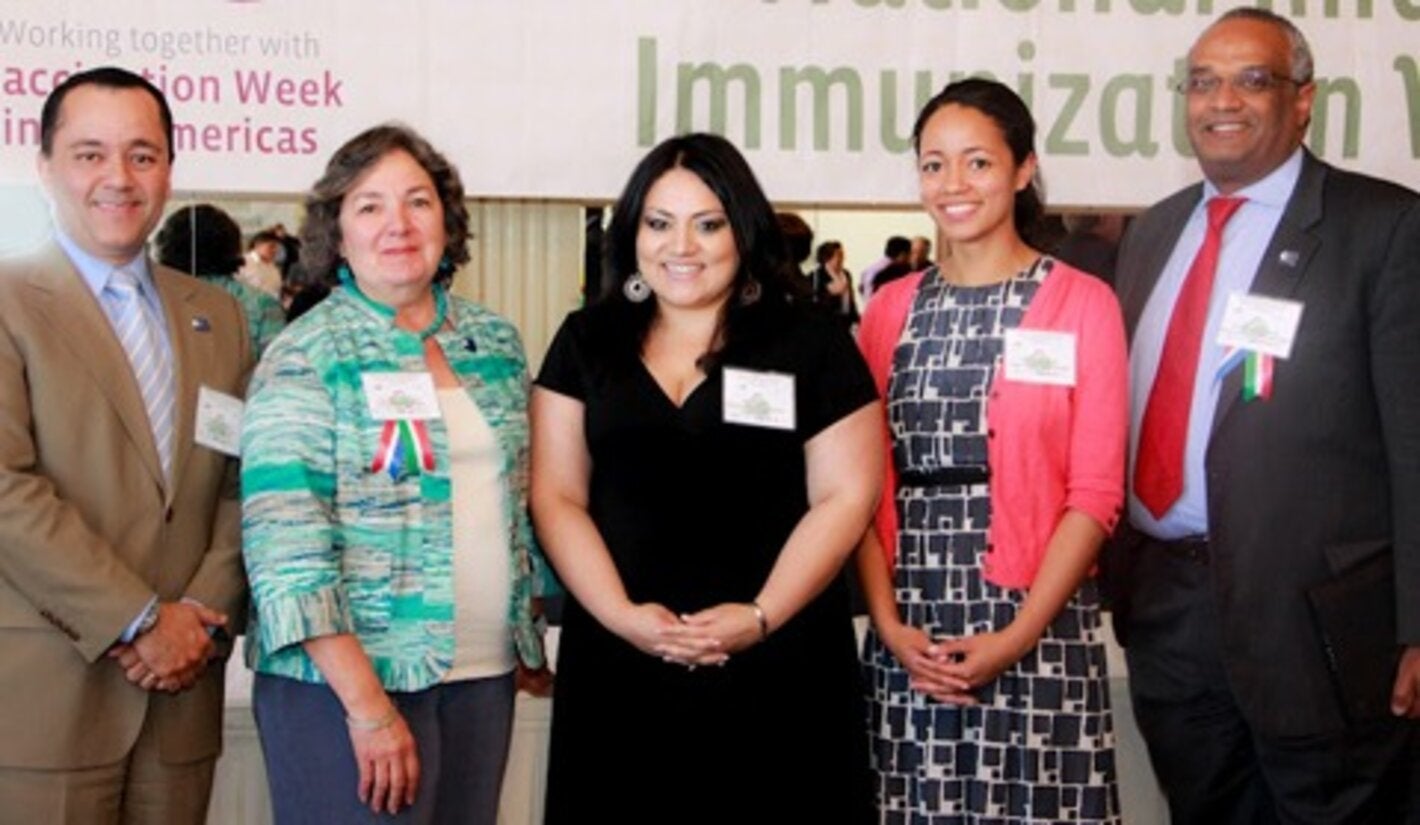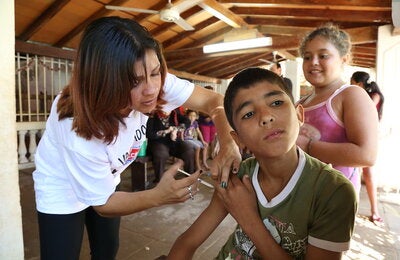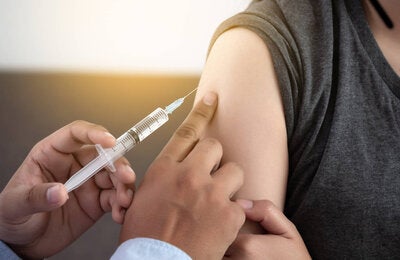
Laredo, TX, April 24, 2012 (PAHO/WHO) - Cities and states along the U.S.-Mexico border will join countries throughout the hemisphere to celebrate the 10th annual Vaccination Week in the Americas and the first World Immunization Week on April 21 to 28, 2012.
More than 365 million people of all ages have been vaccinated during the past nine years within the framework of Vaccination Week in the Americas. This year's Vaccination Week in the Americas regional goal is to vaccinate some 44 million people in the 45 participating countries and territories. With the slogan "For you, for me, for everyone: get vaccinated," this year's initiative encourages vaccination not only for children but also for entire families.
"In the Americas in recent years, Vaccination Week in the Americas has grown and become the largest multinational health initiative in the region, because of the political commitment of governments and the dedication of health workers in the region. Immunization is one of the most successful and cost-effective health initiatives and prevents two to three million deaths each year globally," said Guillermo Birmingham, Pan American Health Organization / World Health Organization (PAHO/WHO) Director of Administration.
The PAHO/WHO U.S.-Mexico Border Office, the U.S.-Mexico Border Health Commission (USMBHC), the U.S. Department Health and Human Services (HHS), the Centers for Disease Control and Prevention (CDC), the Secretary of Health of Mexico and its northern-state health jurisdictions and municipalities, the General Mexican Consulates in the United States and other border entities joined to organize over 60 events along the border, including health fairs, video conferences, workshops, continued education courses and door-to-door vaccination campaigns.
The main event was held in Laredo, Texas, and included the formal United States-Mexico border inaugural ceremony. A workshop to exchange mutual best practices followed the event and included discussions on strengthening cross-border cooperation between U.S. and Mexico health departments, disseminating bilingual information to health care providers, and increasing communication strategies targeting families regarding vaccination for all age groups. "We need to focus on strengthening the epidemiological surveillance of vaccine-preventable diseases and preparing a status report of immunization coverage in the border," added Dr. Maria Teresa Cerqueira, PAHO / WHO-Mexico Border Chief.
During this ceremony, U.S. and Mexican federal, state, and local authorities, including those from the border states of Tamaulipas and Texas, set targets and highlighted vaccination achievements in the Mexican cities of Matamoros, Rio Bravo, Reynosa, Nuevo Laredo, and others along the border, including the U.S. cities of Brownsville, McAllen and Laredo, Texas. Tamaulipas and Texas municipal health authorities renewed their commitment to coordinate efforts for increased childhood immunizations and vaccinations to counter health problems, such as tetanus, rubella, pertussis, influenza, tuberculosis and other diseases preventable by vaccination.
"When we care about a better future, we must worry about having a better present. This begins by giving a great support to our children and young people to become better; we do it through education, but also we do it through health. If they grow strong and healthy, they are more likely to succeed in life as men and women, so this Vaccination Week will be very useful for us all," said Nuevo Laredo Mayor Benjamin Galvan Gomez.
It is important to highlight the strong, multi-level support and political visibility generated by the U.S. and Mexico, most notably Dr. Hector Gonzalez, Laredo Health Department Director, and Dr. Jaime E. Gutierrez Serrano, Nuevo Laredo Secretary of Health; Cynthia Liendo Espinoza, Laredo Mayor Representative, Benjamin Galvan Gomez, Nuevo Laredo Mayor, and his wife Martha Alicia Aldapa, DIF President. USMBHC representatives included Dr. Maria Teresa Zorrilla, Executive Secretary BHC-Mexico Section and Julia Goldberg, Acting General Manager BHC-U.S. Section. Other key participants included Texas Commissioner Dr. David Lakey and Dr. Patricia Vidal Vasquez. Federal level attendees included JoEllen Wolicki, representing HHS / CDC. Regional and global-level representation included Guillermo Birmingham, PAHO/WHO Director of Administration for the Americas Region and Dr. Maria Teresa Cerqueira, Chief of the PAHO/WHO U.S.-Mexico Border Office.
"The achievements have shown a decrease in the number of cases of hepatitis A, diphtheria, hepatitis B and pertussis in Texas, but in this case there is still a significant drop in the trend, proving that we need to further intensify information campaigns and education to parents," stated Dr. David Lakey, Texas Commissioner.
JoEllen Wolicki, representing HHS / CDC, said that even when health workers in the United States are doing an excellent job, as the U.S. has reached almost 90 percent of national immunization coverage, there is still much to do. "Highlighting the outbreaks and cases of pertussis that have occurred in the past year, in 2010 there were more than 27,000 cases nationwide, resulting in a high number of hospitalizations and 27 deaths, of which 25 were infants less than one year of age. Less than a week ago, the state of Washington indicated that cases of pertussis had reached epidemic levels with over 897 cases in over 23 counties, which had not been seen in decades. These situations show us that children who are not fully vaccinated are exposed to diseases, get very sick and could spread the virus throughout the community."



